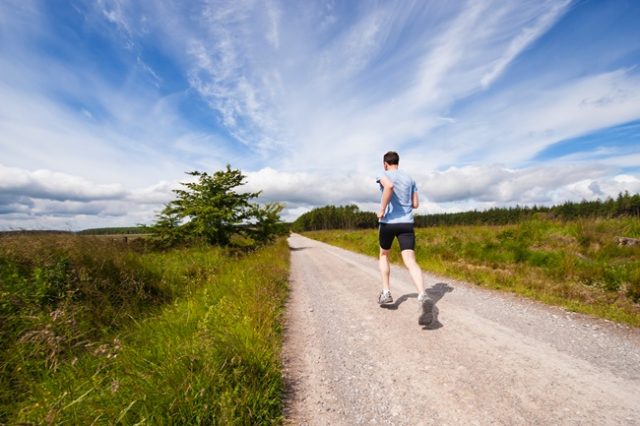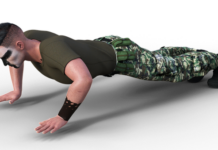You want to lead a healthy life and for this reason you have seriously considered eating in a healthier way, with less fat, less sugar and salt… and at the same time frequently performing some type of physical exercise. It is a project that you have considered on more than one occasion but now you take it seriously because you see that if not, being overweight will cease to be so and will become a real problem.

It is very likely that what you have started doing is going for a run every morning or every night in your neighborhood or in a nearby park, or on the quieter streets. However, once you go out with your shoes and your great desire to practice sports, you start the race, and after a reasonable time, you are satisfied, because you are meeting your goals, but you also end up very tired.
You continue with your routine day after day, but the tiredness accumulates throughout the week, but you do not stop huffing and puffing continuously and you really feel exhausted. You wonder if you will always have to continue paying that toll for doing a good physical exercise, if the achievement of being in shape will be accompanied until the end by that fatigue that is so hard to bear.
The answer is no. There are ways to reduce and eliminate exhaustion after a running session. We explain how it is possible to run and get little tired, so that your body is in the best physical shape and yet fatigue is at bay.
Fill the tank
Running is an exercise that, like others, burns calories, burns energy, and this energy must be in the body. Which means that you should eat plenty of carbohydrates before going to exercise? Carbohydrates are transformed into glucose when digested, which is the basis of the energy you need when your muscles require a major effort such as a race.
Precisely, fatigue when you run can be due to insufficient carbohydrates when you go out to exercise. That is why it is recommended that you eat a meal, be it breakfast or another, at least two hours before, or one hour before eating something rich in carbohydrates, such as some fruit or bread or similar.
At your own pace
The gasps when you run out of breath, the tiredness and the burden when you run also have a lot that you demand too much for what your legs can give. In other words, you must run at your own pace, in accordance with your muscular state and keep in mind that you do not have to run too fast or go further than your heart capacity allows you.
Calculate so you don’t get tired
And how can you calculate that capacity? There is a simple way. It is about subtracting your age from the figure of 220, and thus you will obtain the maximum pulsations that your heart can have at maximum physical performance, such as running fast and in distance. For example, if you’re 35 years old, subtract that from 220, and you’ll get your recommended maximum heart rate of 185 beats per minute.
Once you know this important fact, when you go running outdoors, or in any other field, try to wear a heart rate monitor, in order to control what number you are at. For the first few times, it’s best to run at 65 percent of your maximum heart rate. Going back to the example above, if you’re 35, and your healthy limit is 185, run until you hit 65 percent of that. That is to say, you will have to control your heart rate until you reach 111, and at that moment abandon the race.
Keep that rhythm in the following running sessions, for a couple of weeks, so that it becomes an exercise that does not tire you at all, that you see that you run comfortably. Once those fifteen days have passed, which could be less, by virtue of your endurance capacity and therefore of running without drowning, you can start looking for a higher heart rate, raising the intensity, running faster and further, for more time, until you reach in this case, 158 beats per minute, that is, 85% of your maximum cardiovascular rate before you run out of breath. Again, you will need a heartbeat measurement watch or bracelet, today very common in sports accessories stores and not very expensive.
The breathing
One of the causes of the feeling of tiredness accompanied by pain when running is the accumulation of lactic acid in the muscles. So that this does not occur and the muscles have oxygenation, the way you breathe while running is important. You must match your breathing with the rhythm of the race. Many experts recommend a rhythm of three times two, that is, three inhalations for two exhalations. It means that you breathe in three times in a row, while taking three strides when running, and that you release the air in the following and immediate two running strides, and so on continuously, until the end of your exercise.
Rest
And, obviously, it is essential that you run having rested enough. If you do not sleep at least six or seven hours, depending on each one, and in a calm and deep way, it is difficult for you not to get tired when running and gasp for breath, because even if your run is rhythmic with your breathing and your diet is balanced, you won’t be able to run without getting very tired.
Constancy
To be able to run and get little tired, it is very important that you cultivate perseverance in your physical exercise. It is very good that you have made the decision to go for a run to stay in shape, but it is clear that if you only do it from time to time, you will not improve your physique, but you will not be able to avoid that when running you are not overwhelmed by fatigue. Quickly. In order for you to achieve your goal of running and getting little tired, you must plan what you want to do and prepare a weekly program. For example, start running twice a week, or once, and from there, increase the frequency, as you see your physical resistance and your availability of time for sports increase. Take notes in a notebook and make a calendar, with the times of each race that you foresee,
More techniques
Early on is when you’ll feel most overwhelmed by fatigue when running, naturally before you have a modicum of form and stamina gained from those repetitive exercise routines. And that is why it is in those beginnings that the strongest temptation to abandon will be, given the growing fatigue that will present itself from the first minutes. Therefore, a good technique to continue in the race is that if the panting or choking is hard, instead of going home, reduce the pace of running, even start walking fast, with which you will catch your breath and immediately you will feel encouraged or encouraged to run again at the pace you have programmed for that day.
















